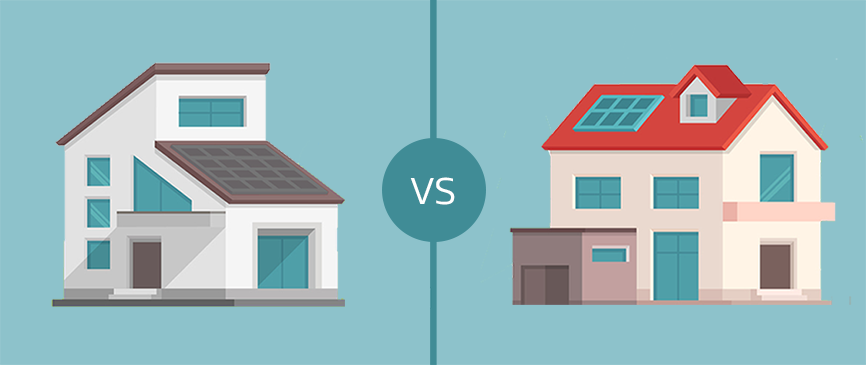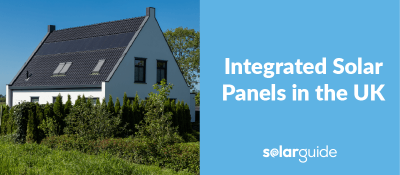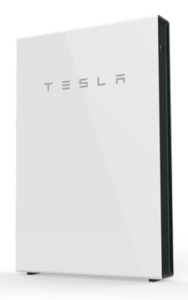Solar Roof Tiles vs Solar Panels

Solar panels are becoming a more and more common sight on UK homes as the technology becomes both more affordable and more effective at generating renewable energy. However, a newer technology known as solar roof tiles has been growing in popularity in the US as an alternative to panels, and the UK market looks set to go the same way.
Here we explore the differences between solar tiles and solar panels including the key considerations, advantages, disadvantages and costs of each option.
What's the Difference Between Solar Panels and Solar Tiles?
Both solar panels and solar tiles include photovoltaic (PV) cells which capture energy from the sun so it can be converted into electricity, enabling you to power your home using more free, renewable energy, lower energy bills and reduce your reliance on energy suppliers and fossil fuels.
Get Free Solar Panel Quotes: Get quotes and compare prices.
Solar panels are well established in the UK and are fitted to mounting brackets which sit on top of the roof tiles or slates. There is usually a gap between the panels and the roof, and they can be installed and angled on the best side of the roof to ensure they receive maximum sunlight.
Solar tiles are like mini solar panels, but they are installed as part of a roof alongside traditional roof tiles rather than sitting on top of them. They are designed to blend in with the roof's aesthetics and can only be installed if you're fitting a completely new or replacement roof.
Solar tiles are a relatively new product and as such only a limited number of manufacturers offer them in the UK. Tesla are the biggest brand offering solar tiles and you are able to pre-order in the UK via their website (with a deposit), but Tesla are yet to confirm when installations will begin.
Comparing Solar Panels and Solar Tiles
Energy Generation and Efficiency
Energy efficiency is important as the higher the efficiency level the better the panels or tiles are at producing electricity for your home. The more electricity they produce the less you'll need to spend on energy bills. Currently solar panels are able to generate more energy, meaning they can take up less roof space and are more cost effective.
However, solar roof tile technology is developing all the time and there have been increases in their generation levels with some CIGS models able to reach conversion efficiency close to traditional panels.
Solar tiles have a typical efficiency of 10 – 20% (on average) while panels usually have efficiencies of at least 16%. The best solar panels can achieve efficiency levels of up to 22% which means you'll see a faster return on your investment.
Installation & Roof Suitability
Firstly, if you don't want to replace your whole roof then solar tiles aren't the option for you. And, even if you are replacing your roof, not all homes are suitable for a solar roof as the pitch and angle must be ideal for the tiles; they cannot be angled and adjusted like traditional solar panels.
Installing solar panels is a much simpler process as they are mounted on brackets on top of the existing roof. They also offer more flexibility in terms of placement and can be arranged for maximum exposure to sunlight.
Get Free Solar Panel Quotes: Get quotes and compare prices.
Aesthetics
One of the biggest selling points for solar roof tiles is how they look. Traditional panels are labelled an 'eyesore' by many people due to their bulkier design; they protrude out from the roof and are usually black or blue in colours whilst solar tiles are designed to blend with or even replicate tiles.
Another consideration with solar panels could be that there is a gap between the panel and roof which could become a nesting area for birds or small animals. This can be prevented with mesh or wire, but again this may not be ideal in terms of maintaining a good-looking roof.
However, there is another option if you are looking for solar panels with a more subtle, integrated solar panel look. Some companies are now offering in-roof solar panels which sit much flusher to the roof.
Durability
Solar panels have an expected lifetime of 20-25 years and have proven to be very durable.
Solar tiles on the other hand have not been used long enough for us to know their average lifetime although many suppliers offer them with a 20 year guarantee. Tesla have gone as far as to claim their solar tiles will last as long as your home is standing!
Solar panels are also easy to replace if they are damaged or develop a fault, but solar tiles are built to withstand the elements and act as functional tiles or shingles, protecting the roof underneath. There are lots of claims that solar tiles are even stronger and more durable than standard tiles.
Cost of Solar Panels vs Solar Roof Tiles
The cost of both solar panels and solar tiles continues to fall, but solar tiles are considerably more expensive. One of the big reasons for this is clearly because the installation is a more complex total roof replacement, but the other is that the technology is newer and the market less competitive.
This table illustrates the potential costs of installing a solar panel system and compared to a solar roof:
| Size of System (Capacity for Energy Generation) | Example Roof Space (m²) | Average Cost of Solar Panel Installation | Average Cost of Solar Tile Roof |
| 1kW | 8+ | £2,000 – £3,000 | £5,000 – £6,000 |
| 2kW | 12+ | £3,000 – £4,000 | £6,000 – £8,000 |
| 3kW | 20+ | £4,000 – £6,000 | £8,000 – £12,000 |
| 4kW | 25+ | £6,000 – £8,000 | £12,000 – £16,000 |
Solar tiles are roughly around twice the price of solar panels and, as they're less energy efficient than panels, it will take longer to see a return on your investment in terms of energy savings. The average family home of 3 or more people needs at least a 3kW system so a solar roof could cost in excess of £10,000 – 12,000.
These costs are estimations. The actual cost will be unique to your home and energy needs and will also vary depending upon your location, the complexity of job and the installer you choose.
However, the cost of solar tiles shouldn't necessarily be a dealbreaker for everyone.
If you're replacing your roof anyway, the cost of a solar roof could be comparable to the cost of a traditional roof. So you get the new roof you're planning on buying anyway, but with the added benefits of solar energy for your home and, potentially, a stronger and more weatherproofed structure.
It's also worth noting that the Energy Saving Trust estimate a solar roof could add as much as 10% to the value of your house which could be a big payback should you wish to sell in the future.
Solar Tiles vs Solar Panels: The Result
When solar tiles become widely available in the UK, your choice will be determined by the factors that matter to you. Every homeowner's priorities and motivations are different but broadly speaking…
Solar roof tiles are a good choice for:
- Homeowners who are concerned about the appearance of their property, i.e. they want solar energy but don't want solar panels sitting on top of their roof.
- New build projects and homeowners who are replacing their roof and would like the dual benefit of solar technology.
- Properties in conservation areas or listed properties which aren't allowed solar panels but can replace the roof.
Comare Solar Roof Tile Manufacturers.
Solar panels are a good choice for:
- Homeowners who are looking to install solar technology without a roof replacement
- Homeowners wanting to get solar energy at home but are on a budget.
- Homeowners who want to generate as much solar energy as possible to maximise the return on their investment.
Whether it's tiles or panels you go for, you'll be benefiting from free, renewable energy for your home, lowering your energy bills and carbon emissions. Remember, solar technology is a long term investment for your family and the planet.
Get Free Solar Panel Quotes: Get quotes and compare prices.
Find local, MSC certified Solar Installers
Start your quote
Find local, MSC certified Solar Installers














